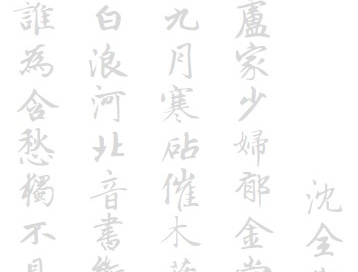Out of Sight: The Most Perfect Version
Shen Quanqi creates haunting images of a rich wife missing her husband
Out of Sight (or A Classical Theme, Presented to Rectifier of Omissions Qiao Zhizhi)
Shen Quanqi
.
The Lady Lu has a fine bedroom:
The very walls breathe perfume,
The very beams have painted scenes,
And pairs of swallows perch between.
The drum of winter laundry frees
The autumn leaves from autumn trees,
It marks ten years that he's been gone
She dreams of Liaoyang garrison.
Beyond where Whitewolf River flows,
No letters come, no traveler goes.
In her town estate by Red Phoenix gate,
The nights are long as the year grows late.
Who has left her sighing? Who is out of sight?
Who made moonbeams shine on saffron silks in the night?
Out of Sight was a title used by many poets, all writing on the theme of a woman missing her husband who has been away for many years. This may be because he loves another, or is away at war, or has gone to work for the emperor. Only one poem with this title was judged good enough to be included in the 300 Tang Poems, but the Complete Tang Poems includes nine with this title, and they form a fascinating series, dating back to the 6th century, before the beginning of the Tang.
Often, the title of a poem gave name of the tune to which it should be sung. However, that doesn't seem to be the case for Out of Sight: some of the poems are very short, while others are medium length; some use short lines, others long. Instead, the poems are linked by two themes: the loneliness of a woman whose husband is away, and rich lifestyles. Both themes are brought out most clearly by Shen Quanqi in the single Out of Sight poem collected in the 300 Tang Poems.
Shen Quanqi lived from 656-714.
Lady Lu was the name used by many poets to refer to a wealthy wife. It came from a folksong/poem written by Xiao Yan.
The perfumed walls are not an exaggeration. During this period, wealthy houses would be plastered using a mix that included sweet-smelling plants.
Whitewolf River was to the north; beyond the river the land was understood to be much wilder.
The Red Phoenix Gate was one of the gates of the palace in Chang'an. The houses built near there were large and rich.
沈全期 独不见/古意呈补阙乔知之
卢家少妇郁金堂,海燕双栖玳瑁梁。
九月寒砧催木叶,十年征戍忆辽阳。
白浪河北音书断,丹凤城南秋夜长。
谁为含愁独不见,更教明月照流黄。




A very interesting detail about the perfumed walls, I was wondering where that had come from. One quibble - shouldn't it be Liaoyang garrison rather than Luoyang?